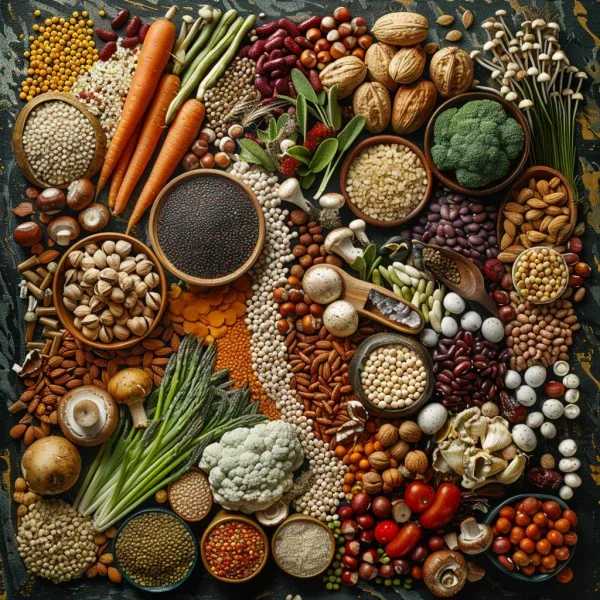by Sofia Moreau

You’ve ditched dairy and said goodbye to meat, but how can you ensure your body is still reaping the essential nutrients it needs? Fear not; conscientious vegans can indeed maintain a nutritionally balanced diet. Uncover the secrets with us as we delve into the seven veritable plant powerhouses that can answer your vegan dietary dilemmas.
Transitioning to a vegan diet may raise concerns about meeting essential nutritional needs such as protein, vitamin D, omega-3 fatty acids, vitamin B12, calcium, iron, and zinc. Rest assured, you can find every bit of those nutrients your body craves within the plant kingdom. Let’s explore seven vegan food sources stepping up to the nutrient plate.
1. Embrace the Power of Beans and Pulses
Packed with protein, beans and pulses also boast a nutritional profile rich in calcium, iron, and fiber. One serving of lentils, for instance, yields around 18g of protein. Further, by swapping wheat-based items for chickpea or lentil-based alternatives, you can effortlessly enrich the nutrient content of your meals.
2. Nut it Out!
Nuts and their buttery counterparts are more than just delectable vegan snacks. Notably, walnuts come highly recommended as a plant-based source of omega-3 fatty acids. Aim to include these in your diet by savoring a palmful of nuts for an afternoon snack, or explore dairy alternatives with nut cheese and creams.
3. Seed the Way to Nutritional Success
Seeds are nutrient-dense, providing a substantial source of omega-3 fatty acids, iron, zinc, calcium, fibre, and protein. Vary your seed consumption to benefit from their distinct nutritional profiles. You can easily incorporate seeds into your diet in breakfast bowls, homemade crackers, or by swapping readymade pesto for homemade pumpkin seed pesto.
4. Nutritional Yeast – The Vegan Hero
A valuable source of vitamin B12 and a complete protein, nutritional yeast is a vegan must-have. Thanks to its nutty, cheesy flavour, it is excellent for topping dishes, from roasted veggies to pasta, and even popcorn!
5. The Wholehearted Benefits of Wholegrains
With their nutrient-rich profile, including B vitamins, fibre, protein, minerals, and antioxidants, wholegrains are linked with lowering the risk of heart disease, type 2 diabetes, and even cancer. Experiment with different grains from wheat to wild rice for their unique health benefits.
6. Make Room for Mushrooms
Packed with nutrients, mushrooms are one of the best vegan-friendly sources of vitamin D. Factor in the antioxidants, beta-glucans, and the reported antiviral and antibacterial effects, and you’ve got a superfood worth savouring.
7. Navigate the Milk Alternatives
When it comes to dairy replacement, nut milks should also be in your conversation. You can still enjoy your milk-based delights but do pay close attention to the ingredients list because some milk alternatives may contain more than you bargained for. Discover the possibilities of coconut yogurt, tofu as a cheese substitute, and remember, nutritional yeast is an excellent replacement for grated cheese.
Eating vegan doesn’t mean reducing nutritional benefits. With these swaps, you can tend to the needs of your body without compromising on taste or valuable nutrients.
Click here for more top tips on going vegan!
vegan diet, nutritional needs, protein intake, plant-based diet, vegan food sources, beans, pulses, nuts, nut butters, seeds, nutritional yeast, wholegrains, mushrooms, milk alternatives
Leave a Reply